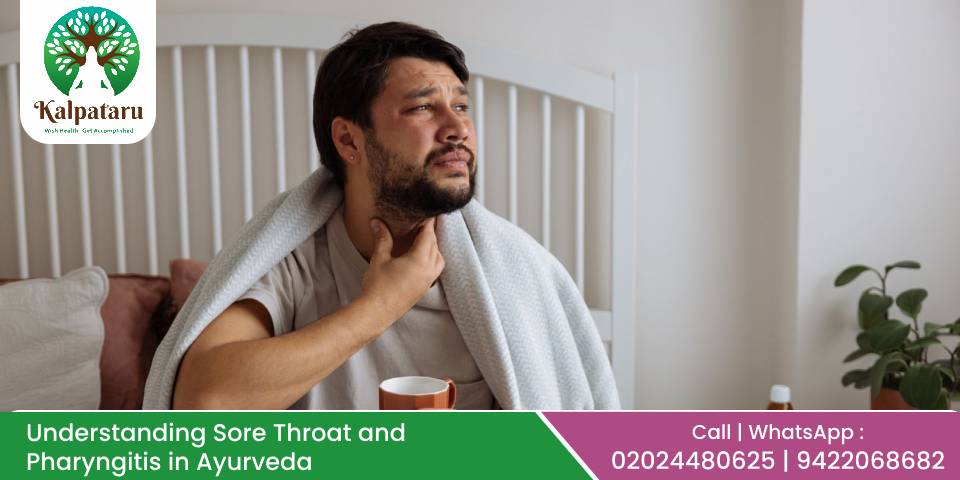In Ayurveda, the throat is considered a significant site for Kapha dosha, which governs mucus production, and Pitta dosha, which controls inflammation and metabolism. Imbalances in these doshas can lead to conditions like a sore throat and pharyngitis.
Dosha-Specific Symptoms:
- Vata Imbalance: Dryness, scratchiness, and a hoarse voice.
- Pitta Imbalance: Burning sensation, redness, and inflammation.
- Kapha Imbalance: Mucus accumulation, swelling, and congestion.
The goal of Ayurvedic treatment is to restore balance among these doshas and strengthen the immune system for long-term wellness.
Causes of Sore Throat and Pharyngitis:
- Environmental Factors: Exposure to cold winds, dry air, or pollutants.
- Dietary Indulgence: Consumption of excessively cold, fried, or spicy foods that aggravate doshas.
- Seasonal Changes: Kapha imbalances are common during winter, while Pitta imbalances often occur during summer or with excess heat exposure.
- Viral and Bacterial Infections: While Ayurveda does not directly address pathogens, it focuses on enhancing immunity to prevent infections.
- Lifestyle Habits: Smoking, excessive talking, or overuse of vocal cords can irritate the throat.
Modern Medical Treatment Options:
For Viral Infections:
- Supportive care: Rest, hydration, and over-the-counter pain relievers like acetaminophen.
- Warm saltwater gargles to reduce swelling and irritation.
For Bacterial Infections:
- Antibiotics such as penicillin or amoxicillin for strep throat.
- Anti-inflammatory medications for pain relief.
For GERD-related Sore Throat:
- Antacids and lifestyle changes like avoiding acidic foods and eating smaller meals.
Chronic Pharyngitis:
- Avoiding triggers such as smoking or chemical fumes.
- Treating underlying causes like allergies or sinus infections.
Ayurvedic Remedies for Sore Throat and Pharyngitis:
Herbal Remedies:
- Tulsi (Holy Basil): Tulsi is a powerful antimicrobial herb. Chewing fresh tulsi leaves or drinking tulsi tea helps soothe throat irritation and boosts immunity.
- Turmeric (Haridra): Known for its anti-inflammatory and antiseptic properties, turmeric can be used in warm milk or as a gargle (turmeric and salt in warm water).
- Mulethi (Licorice Root): Mulethi is renowned for its soothing and demulcent properties. Sucking on licorice lozenges or boiling mulethi in water for tea relieves throat pain.
- Ginger (Adraka): Ginger is a potent anti-inflammatory and immune-boosting herb. Drinking ginger tea with honey is highly effective for reducing throat inflammation.
- Clove (Lavanga): Cloves have a numbing effect and antimicrobial properties. Sucking on a clove or using clove oil in warm water for gargling provides quick relief.
Ayurvedic Therapies:
- Kavala or Gandusha (Oil Pulling): Gargling with warm herbal decorations help lubricate the throat, reduce dryness, and remove toxins.
- Pratimarsha Nasya: Applying medicated oils like Anu Taila to the nasal passages clears Kapha and improves respiratory health, indirectly relieving throat issues.
- Steam Inhalation: Adding eucalyptus oil, tulsi, or mint leaves to boiling water and inhaling the steam clears congestion and reduces Kapha accumulation.
Dietary Adjustments:
- Consume warm, soothing foods like soups, khichdi, and herbal teas.
- Avoid cold, sour, and processed foods that aggravate Kapha and Pitta.
- Drink warm water throughout the day to maintain hydration and ease throat discomfort.
- Include spices like cinnamon, black pepper, and turmeric in your meals for their therapeutic effects.
Lifestyle Modifications:
- Protect the throat from cold air by wearing scarves or using warm beverages.
- Practice pranayama (breathing exercises) like Anulom Vilom to enhance respiratory function.
- Maintain oral hygiene by gargling with saline or herbal decoctions.
Ayurvedic Preventive Measures:
Daily Practices:
- Use turmeric and black pepper in your daily cooking to maintain throat health.
- Practice oil pulling with sesame oil every morning to keep the throat lubricated and reduce toxin buildup.
Ritucharya (Seasonal Regimens):
- Follow Ayurvedic seasonal routines to minimize dosha imbalances. For instance, consume warm and Kapha-reducing foods during winter.
Boost Immunity (Ojas Building):
- Drink Chyawanprash (an Ayurvedic herbal jam) to strengthen immunity.
- Include Amla (Indian gooseberry) in your diet for its high Vitamin C content.
Avoid Triggers:
- Limit exposure to allergens, pollutants, and irritants that may cause throat irritation.
- If you are suffering from pharyngitis on recurrent basis, then consulting ayurvedic physician is always a good option. By means thorough history taking and trying herbal medicines which boost immnubity , you can get rid of recurrent pharyngitis issue
Conclusion:
Ayurveda offers a comprehensive and natural approach to managing sore throat and pharyngitis by addressing their root causes through dosha balancing. Herbal remedies, dietary modifications, and Ayurvedic therapies not only alleviate symptoms but also promote long-term throat health.
For severe or recurring throat issues, consulting a qualified Ayurvedic practitioner can help personalize treatments based on your unique dosha constitution. Embracing Ayurveda ensures not just symptomatic relief but also holistic well-being, aligning your body with nature’s rhythms.
Dr. Manoj Deshpande and Dr. Aparna Deshpande at Kalpataru Ayurvediya Chikitsalaya™ Clinic provide the best Ayurvedic Treatment for Psoriasis & various diseases in Pune, Maharashtra. For more information about our comprehensive treatment options, or to requestan appointment with the best Ayurvedic Doctor in Pune, call +919422068682 / +919764837167 / 020-24480625 or Click on Book an Appointment.
Stay natural, stay healthy!

